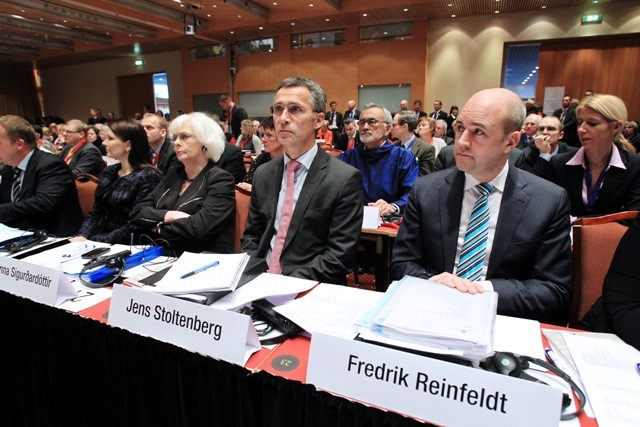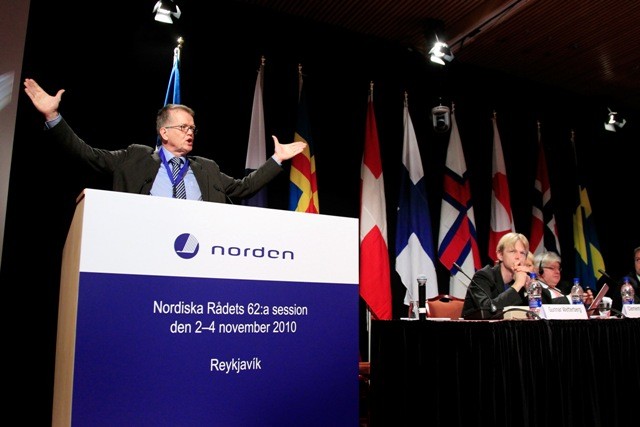|
A good exercise for the mind Professor ´Olafur Đ Harđarson from Iceland considered Wetterberg's idea to be a good exercise for the mind, especially now when the Nordic model of a welfare society is widely disputed. However, according to Harđarson Nordic cooperation is more popular than ever in Iceland.
Thus, he states that the question is rather why the Nordic countries have not formed a union and why this is not possible. According to his opinion other world powers have for hundreds of years preferred to see the Nordic region as a fragmented area and they still do, because jointly they would constitute a considerable force - as can be seen from the fact that in various social surveys individual Nordic countries always achieve high places. Big players A solid argument for his viewpoint is the weak position of the Nordic countries in the EU when compared, for example, to Germany or France. Also, the voice of the Nordic states is neither heard in the G20 nor is it strong in the UN. Last year at the UN Climate Conference held in Copenhagen the Nordic countries were prepared to achieve much more than a number of other countries, but remained a lone voice in the desert, The Nordic countries have it in their nature to make fast progress, but cumbersome mechanisms, such as the EU and the UN, operate slowly. Wetterberg recognised that due the fact that Finland, Norway and Iceland are viewed as the so-called small brothers of the Nordic countries, the idea of a united federation might cause some emotional distress among the latter: the thinking goes that we have managed to keep our distance from unions and now again... Still, they have had enough time to stand firmly on their own feet. They have already passed their big brothers. Experts and representatives debating with Wetterberg argued that the foundation of such a federal state is impossible. Jens Klarskov from the Danish Chamber of Commerce pointed out that fiscal and tax policies of the Nordic countries are too varied to create a federation. He reasoned that if now those five countries are not able to dissolve such differences, then how should a federation achieve this goal? Support for the idea of the United Nordic Federation varies across generations: younger people are for it, older ones against. Finnish representative Maarit Feldt-Ranta said that in the eyes of young people the Nordic countries have already merged into a uniform region and they take it for granted as such: they study, work and form relationships across borders, but collide with disturbing border barriers when settling down. Feldt-Ranta observed, in conclusion, that while everyone supports cooperation across EU countries and regards it as feasible, although it is hindered by serious problems, the idea of a United Nordic Federation is called utopian. Kristin Clemet, head of the Norwegian Civita Centre for Political Research, added that it would be interesting to learn the opinion of those who have so far strongly rejected the EU. |
||
|
related links: |
||
Swedish Prime Minister: no need for a Nordic federal state
|
Reinfeldt welcomed Wetterberg's idea of a Nordic federal state and extensive debates it has initiated in the Nordic region as well as in other European countries, though. However, the Swedish Prime Minister stressed that three of the Nordic countries, that is Finland, Sweden and Denmark, have chosen the EU as a means to facilitate closer cooperation and the removal of border barriers. The launch of Wetterberg's book "United Nordic Federation" in Reykjavik the day before the summit meeting was accompanied by a panel discussion of business figures and analysts from all the Nordic countries. Per Kristian Foss, former Norwegian Minister of Financial Affairs and member of the Nordic Council of Ministers, admitted in front of an audience of more than 200 that his homeland has withdrawn from two Nordic unions and now the country is doing better than ever. |

 Current Nordic cooperation is efficient enough and there is no need for the United Nordic Federation proposed by historian Gunnar Wetterberg, noted the Swedish Prime Minister Fredrik Reinfeldt at a joint press conference with the other four Nordic leaders at the summit meeting of the Nordic Council held in Reykjavik.
Current Nordic cooperation is efficient enough and there is no need for the United Nordic Federation proposed by historian Gunnar Wetterberg, noted the Swedish Prime Minister Fredrik Reinfeldt at a joint press conference with the other four Nordic leaders at the summit meeting of the Nordic Council held in Reykjavik. In his comments Gunnar Wetterberg tried to ward off claims that forming such a federation is an entirely unrealistic notion, an empty talk. He marked that in the rest of the world regions that share a common cultural background and a strong sense of solidarity have united long ago: for example, the UK, France, Spain, Italy and Germany. Yet neither Germany nor the UK nor even the US is a source of inspiration for Wetterberg's idea of a federation, but Switzerland where four languages have the status of an official language.
In his comments Gunnar Wetterberg tried to ward off claims that forming such a federation is an entirely unrealistic notion, an empty talk. He marked that in the rest of the world regions that share a common cultural background and a strong sense of solidarity have united long ago: for example, the UK, France, Spain, Italy and Germany. Yet neither Germany nor the UK nor even the US is a source of inspiration for Wetterberg's idea of a federation, but Switzerland where four languages have the status of an official language.